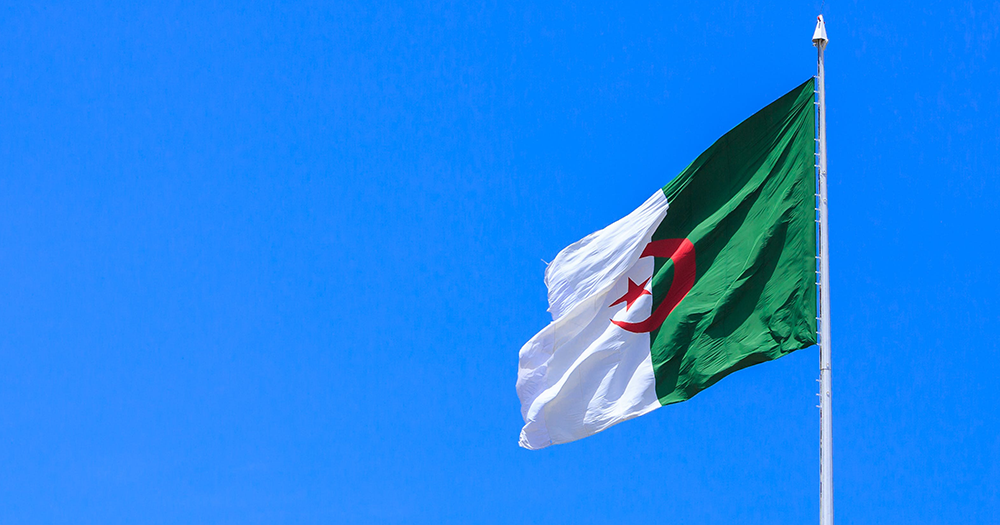Algeria has been added to Ireland’s list of ‘safe countries’ of origin for asylum seekers, despite its anti-LGBTQ+ laws. Minister for Justice Helen McEntee announced the move on Tuesday, January 30, as immigration continues to be a key talking point ahead of local elections later this year.
A country is deemed ‘safe’ when there is generally no persecution, torture, inhumane or degrading treatment, or conflict. Being added to the list means that people from those nations seeking International Protection may still be recognised as refugees, but will have their cases decided within a maximum of 90 days, with quicker decisions reported to be linked to a decrease in successful applications.
Algeria has qualified for the safe countries list despite LGBTQ+ people and same-sex activity between males and females being illegal in the country, with offences punishable by up to three years imprisonment and a fine.
As recently as September 2023, a man known as ‘M.H.’ was arrested in the country for allegedly promoting homosexuality online, and was convicted to 18 months in prison and fined 10,000 dinars. In 2020, there was a mass arrest of 44 people who were accused of attending a same-sex wedding in July. Two men understood to be the grooms were sentenced to two years imprisonment and a fine, while the others each received a one-year suspended sentence.
Algeria additionally has a history of arresting well-known activists and, despite recent reforms, authorities continue to crack down on human rights defenders and organisations, independent journalists and other dissidents in the country. Furthermore, advice published by Ireland’s Department of Foreign Affairs recommends that people avoid non-essential travel to parts of Algeria and maintain a high degree of caution in others. Terrorism is said to be a threat outside the capital Algiers, as well as around other cities, in border regions and in the south where shootings, bombings and kidnappings are carried out.
Alongside Algeria, Botswana was similarly added to the safe countries list, despite concerns regarding gender-based violence, attacks on children, indigenous peoples’ rights and the presence of the death penalty. The eight other nations included are Albania, Bosnia and Herzegovina, North Macedonia, Georgia, Kosovo, Montenegro, Serbia and South Africa.
? Minister @HMcEntee announces new measures to expedite international protection application processing
?Botswana and Algeria added to Safe Country list – applicants from these countries will receive a decision in less than 10 weeks
More belowhttps://t.co/uL34UEoQeP pic.twitter.com/TTWKwdjKSJ
— Department of Justice ?? (@DeptJusticeIRL) January 30, 2024
“My priority is that those who are in need of international protection receive it quickly, and those who are not entitled to it are removed from the system quickly too. This is the hallmark of a robust and rules based immigration system,” Minister McEntee stated.
“Given the difference the accelerated procedure I introduced in late 2022 has had already, I do expect the addition of Botswana and Algeria to have an immediate impact. Cases from those countries designated as safe are currently receiving a decision in less than 10 weeks and applications from people from those countries are down by 38%.
“I must emphasise however that an application by a person from a safe country still receives a full consideration on its merit by the International Protection Office. We have seen that in the current list of safe countries, there are still grants in cases where people can show that their personal circumstances mean that their country is not safe for them.”
A tender request was also issued on Tuesday on behalf of the Department of Justice seeking information about using chartered flights to deport asylum seekers whose applications have been refused.
“My intention is that where possible, where necessary if it is required, we would be able to use the charter flights to potentially bring a larger group of people to one particular country if you have a number of decisions taken in a similar timeframe where that’s possible,” Minister McEntee explained.
“Instead of taking a potentially dangerous person or someone who might be a risk on a commercial flight, they would then be taken on a smaller chartered flight. It is very much to have the options. I don’t have any data, I don’t have any timelines in mind here.”
She is also considering increasing fines for airlines if passengers arrive to Ireland without passports or official documents.
© 2024 GCN (Gay Community News). All rights reserved.
Support GCN
GCN is a free, vital resource for Ireland’s LGBTQ+ community since 1988.
GCN is a trading name of National LGBT Federation CLG, a registered charity - Charity Number: 20034580.
GCN relies on the generous support of the community and allies to sustain the crucial work that we do. Producing GCN is costly, and, in an industry which has been hugely impacted by rising costs, we need your support to help sustain and grow this vital resource.
Supporting GCN for as little as €1.99 per month will help us continue our work as Ireland’s free, independent LGBTQ+ media.
